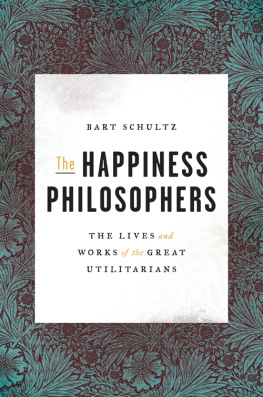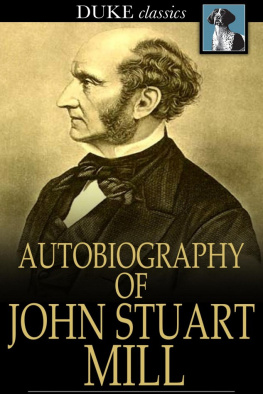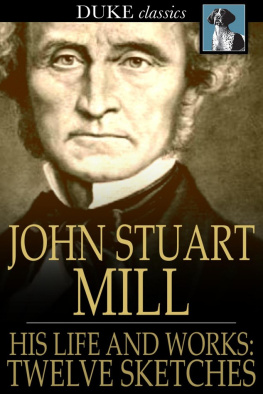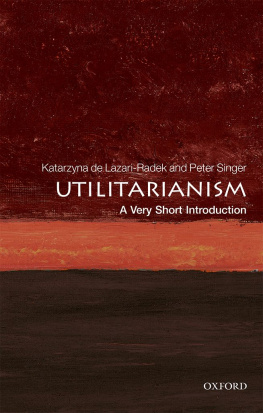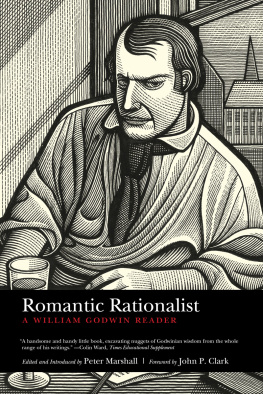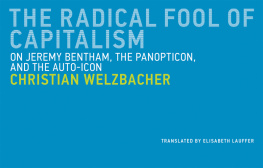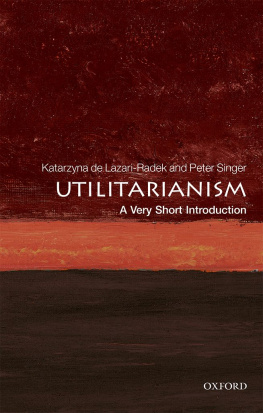
THE HAPPINESS PHILOSOPHERS
The Happiness Philosophers
THE LIVES AND WORKS OF
THE GREAT UTILITARIANS

Bart Schultz
PRINCETON UNIVERSITY PRESS
PRINCETON & OXFORD
Copyright 2017 by Princeton University Press
Published by Princeton University Press,
41 William Street, Princeton, New Jersey 08540
In the United Kingdom: Princeton University Press,
6 Oxford Street, Woodstock, Oxfordshire OX20 1TR
press.princeton.edu
Jacket art: Marigold, by Morris & Co., 1873.
Hand block-printed paper, 73 22 in. (186.06 57.15 cm.).
Photo Museum Associates / LACMA
Jacket design by Andrea Guinn
All Rights Reserved
ISBN 978-0-691-15477-0
Library of Congress Control Number 2017932289
British Library Cataloging-in-Publication Data is available
This book has been composed in Miller
Printed on acid-free paper.
Printed in the United States of America
10 9 8 7 6 5 4 3 2 1
For Madeleine
Wise and Imaginative, Brave and Strong, Smart and Centered,
And always Kind
CONTENTS
PROLOGUE
AFTER THE VICE PRESIDENT of the United States Aaron Burr killed his political rival Alexander Hamilton in a duel, on July 11, 1804, his reputation grew steadily more radioactive, until some years later he was forced to leave the country that he had long served. Traveling Europe between 1808 and 1812 as a largely friendless object of controversy, Burr found something of a refuge with two of the great utilitarians, William Godwin and Jeremy Bentham, figures who never went out of their way to avoid controversy when they could instead productively cause it.
Burr had long admired Godwins famous (and alas, late) wife, Mary Wollstonecraft, author of the 1792 Vindication of the Rights of Woman and one of the worlds first great feminists. Burr believed in equality for women and used to have Wollstonecrafts picture hanging over his mantel. Godwin, living in London with his family, welcomed Burrs company. Burr, for his part, was delighted to be received by one of the most amazing literary families in history, and he developed a special affection for the daughter of Godwin and Wollstonecraft, Mary, who would in short order run off with and then marry the scandalous, brilliant atheist poet Percy Bysshe Shelley and write the horror classic Frankenstein. As Charlotte Gordon has observed, even at age thirteen Mary was impressive. One evening, the children persuaded Burr
to listen to eight-year-old William deliver a speech that Mary had written, entitled The Influence of Government on the Character of the People. Fanny served tea while Burr admired a singing performance by Jane .
Burr praised the tea and the song, but he reserved his greatest praise for the speech and the speechwriter. Even at thirteen, Mary knew that she was the one who had taken the laurels. She had won Burrs attention with her pen. Her father had taught her that writing was her legacy, that she was the daughter of Wollstonecraft and Godwin, the child of philosophers.
When Burr was not at home with the Godwins, or traveling around Europe, he might well be found at home with Bentham, enjoying the run of Benthams library. Burr stayed with Bentham, using his mailing address, during his time of European exile, and he introduced the freethinking Irish artist Amelia Curran to him in 1811. Curran painted Benthams portrait and spent much time with him at Queens Square Place. She apparently grew quite close to Bentham, who took the place in her heart that Burr had previously occupied. Bentham and Burr were reconciled, but what became of the relationship with Curran remains unknown, though she did become close friends with Percy and Mary Shelley, painting several portraits of the poet.
Burr did however proclaim himself Benthams disciple.
Did Burr also meet the precocious young John Stuart Mill, whose father was one of Benthams disciples and consulted Bentham on the education of his children?
The great classical utilitarians lived and worked in just such amazing, absorbing webs of people and places. Mary Wollstonecraft, William Godwin, Aaron Burr, Mary Shelley, Percy Bysshe Shelley, Amelia Curran, Jeremy Bentham, John Stuart Millsuch are the fascinating figures featured in this book, which seeks to bring to life the history of classical utilitarianism in a way worthy of its founders, who ought to be as controversial now as they were then. Their struggles continue, not least their struggles to guarantee a decent education for all and an end to needless suffering. Oddly enough, and despite the passing of centuries, no one today really knows with any finality what is living and what is dead in the classical utilitarianism of Godwin, Bentham, Mill, and Sidgwick, the main characters featured in this book. Their defenses of the claim that the greatest happiness, or pleasure, of the greatest number is the ultimate moral standard remain both rich, historically contextualized resources and a set of ongoing research projects, with the history informing the research and vice versa. The more one probes, the more one needs to probethe strange only leads to the stranger, to more possibilities. But even in our broken world, the possibilities are very promising.
ACKNOWLEDGMENTS
THE ACKNOWLEDGMENTS SECTION of my book Henry Sidgwick, Eye of the Universe, is nine pages long, and much as I would like to repeat all of those expressions of gratitude again and again, I must content myself here with a simple declaration that they still standif anything, my indebtedness has grown with time. But there are a few people and places that I must mention here, their contributions to this book being so conspicuous. Among philosophical colleagues, two reviewers for Princeton University have been extremely helpful. One has remained anonymous, but one has been revealed as Roger Crisp, whose extensive commentary is evident on nearly every page of what follows. My Princeton editor, Rob Tempio, has been absolutely wonderful, and his encouragement was crucial in bringing this book to completion. His colleagues Ali Parrington and Eva Jaunzems have also been most supportive, and Maria denBoer did an excellent job of compiling an index. Others who have provided vitally important, encouraging critical feedback on all or part of this work (or certain earlier publications incorporated herein) include: Philip Schofield, the late Derek Parfit, Peter Singer, Kasia de Lazari-Radek, Fred Rosen, Rob Shaver, Anthony Skelton, Brad Hooker, Mariko Nakano-Okuno, Martha Nussbaum, J. B. Schneewind, John Skorupski, Alan Ryan, Georgios Varouxakis, Robert Cord, Jim Crimmins, Thomas Hurka, Placido Bucolo, Hortense Geninet, Alan Gauld, Francesca Mangion, Bill Mandler, Simon Cook, Frank Turner, Tom Holt, Timuel D. Black, and the late Terence Moore.
While I was in the process of correcting the proofs for this book, I received the devastating news that Derek Parfit had died. My first major publication in philosophy was devoted to Parfits arguments about personal identity, and it was through Parfit, and the late Brian Barry, that I first came to be absorbed in Sidgwick studies. No philosopher has meant more to me than Parfit, and virtually every line of this book, and of my previous books, was written with him in mind. His always generous, always insightful comments on my work, including chapter four of this book, meant more to me than I can say.
I would also like to record my debt to Danielle Allen, whose creation, the University of Chicago Civic Knowledge Project (CKP), has given me a new perspective on philosophy over the course of the last decade, as I have served as its Executive Director. A similar acknowledgement is owed my colleagues on the Board of the Philosophy Learning and Teaching Organization (PLATO). In addition, I would like to thank Sir Richard McAlpine, for generously allowing me to visit Stone Gappe and taking the time to discuss its history with me. Also, Paul and Lucy Irven were extraordinarily gracious and hospitable, when I unexpectedly dropped in on them, upon determining that their Skipton residence (along with the adjoining Cross Keys pub and a power station) was once part of the Old Grammar School and the likely birthplace of Henry Sidgwick. Sidgwicks great niece, Ann Baer, now over one hundred years old, has as always been a wonderful friend and extremely helpful during my visits with her, as has her nephew Andrew Belsey. Naturally, there are also all those libraries that I love so dearly: at Cambridge University, the Wren Library, Trinity College (my favorite library of all), the University Library, Newnham College Library, and Kings College Library; at Oxford, the Bodleian Library; the British Library and the Lambeth Palace Library; the Bentham Project at University College London, and all the others listed in
Next page
